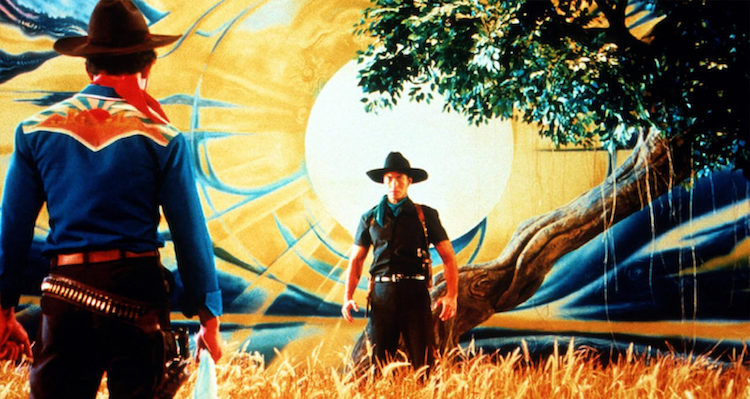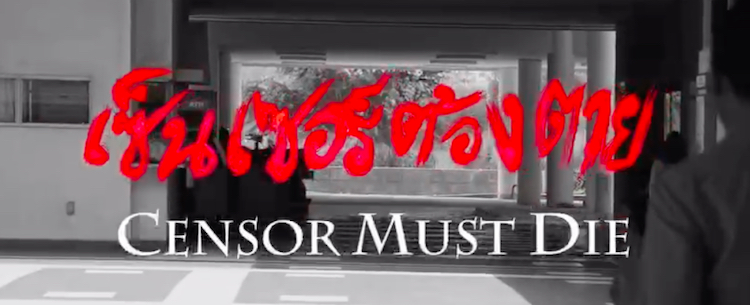
The Thai Film Archive in Salaya shows a continuous programme of classic films, though over the next two months there will be some especially remarkable screenings. September and October’s highlights include several of the most important Thai films of all time, and classics of world cinema.
There will be a chance to see a selection of films on the national heritage register. (Each year since 2011, titles have been added to a list films of artistic or historical significance, with new additions announced each 4th October.) These range from the documentary การปฏิบัติหน้าที่เพื่อประเทศชาติในตำแหน่งหัวหน้ารัฐบาลและผู้นำทางทหาร จนถึงล้มป่วยและอสัญกรรมของ ฯพณฯ จอมพลสฤษดิ์ ธนะรัชต์ (‘Field Marshal Sarit Thanarat performing duties for the country as the head of government and military leader until his illness and death’) on 19th September, to Somboonsuk Niyomsiri’s all-time classic A Man Called Tone (โทน) on 2nd and 27th September.
There will be a chance to see a selection of films on the national heritage register. (Each year since 2011, titles have been added to a list films of artistic or historical significance, with new additions announced each 4th October.) These range from the documentary การปฏิบัติหน้าที่เพื่อประเทศชาติในตำแหน่งหัวหน้ารัฐบาลและผู้นำทางทหาร จนถึงล้มป่วยและอสัญกรรมของ ฯพณฯ จอมพลสฤษดิ์ ธนะรัชต์ (‘Field Marshal Sarit Thanarat performing duties for the country as the head of government and military leader until his illness and death’) on 19th September, to Somboonsuk Niyomsiri’s all-time classic A Man Called Tone (โทน) on 2nd and 27th September.

Sarit Thanarat
The Sarit newsreel, previously screened at the Borderless Film Festival (เทศกาลภาพยนตร์ไร้พรมแดน) in Khon Kaen, is a fascinating example of Cold War state propaganda. At the time of its original release, it would have provided a counter-narrative to the exposés of the dictator’s decadence and corruption that were rushed into print after his death. The film depicts Sarit as a PM dedicated to his people, especially in Isan, where he is seen working to alleviate poverty. He is portrayed as a tireless leader, to the extent that he became ill through overwork, and the film ends with scenes of national mourning following his state funeral.

A Man Called Tone
The release of A Man Called Tone in 1970 was a turning point in Thai cinema history. Filmed in widescreen 35mm, it marked the end of the 16mm era, a formulaic mode of production that had dominated the industry for the previous twenty years. Stylistically, its modern approach to characterisation, acting, narrative, music, and cinematography was equally groundbreaking. It was last shown in 2023, to mark Somboonsuk’s ninetieth birthday, and was previously screened in 2022 at Doc Club and Pub in Bangkok, though a gala screening at the Scala cinema in 2020 was cancelled due to the coronavirus pandemic.

Monrak Luk Thung
If A Man Called Tone signalled the birth of modern Thai cinema, the blockbuster musical Monrak Luk Thung (มนต์รักลูกทุ่ง) marked the end of the golden age. Starring Mitr Chaibancha and Petchara Chaowarat, Thai cinema’s greatest stars, and released in 1970 — the same year as A Man Called Tone — it was an unprecedented box-office success. It will be shown at the Film Archive on 1st and 24th October, as part of The Influencer, a season of films starring Mitr and inspired by him.
The Influencer also includes two films by Wisit Sasanatieng: Tears of the Black Tiger (ฟ้าทะลายโจร) and The Red Eagle (อินทรีแดง). Tears of the Black Tiger, a tribute to Mitr’s era of filmmaking, is screening on 11th and 21st October. The Red Eagle, a direct remake of Mitr’s final film, will be shown on 14th and 29th October. (Both films were previously shown by the Film Archive at Wisit retrospectives in 2021 and 2010.)
The Influencer also includes two films by Wisit Sasanatieng: Tears of the Black Tiger (ฟ้าทะลายโจร) and The Red Eagle (อินทรีแดง). Tears of the Black Tiger, a tribute to Mitr’s era of filmmaking, is screening on 11th and 21st October. The Red Eagle, a direct remake of Mitr’s final film, will be shown on 14th and 29th October. (Both films were previously shown by the Film Archive at Wisit retrospectives in 2021 and 2010.)

Tears of the Black Tiger
Tears of the Black Tiger, Wisit’s directorial debut, became a cult classic due to its uniquely over-saturated colour palette, its ‘spaghetti western’-style violence, and its lakorn-style melodrama. Celebrating its twenty-fifth anniversary this year, it’s one of the greatest Thai films ever made. It has been shown quite frequently over the years: in Chiang Mai in 2022, at Alliance Française in 2020, at Bangkok Screening Room in 2017, at Thailand Creative and Design Center in 2016, at Bangkok Art and Culture Centre in 2012, and at the Film Archive in 2013 and 2009.

The Red Eagle
The Red Eagle stars Ananda Everingham (who I interviewed in 2013) as the masked superhero originally played by Mitr, but in this updated version, the Red Eagle is as much a criminal as a hero. Like Iron Man, he is dependent on pain-relieving medication; like Batman in The Dark Knight, he rides a gleaming black motorbike; like both of them, he has no superpowers.
Political corruption is a major theme, and scenes in which the Thai PM’s car is surrounded by protesters are a reminder of the 2009 Songkran demonstrations in Bangkok. In fact, The Red Eagle is one of the few films to feature a prime minister as a character, in this case one who abandons his principles once he assumes office, reneging on a pre-election pledge to ban nuclear power.
Political corruption is a major theme, and scenes in which the Thai PM’s car is surrounded by protesters are a reminder of the 2009 Songkran demonstrations in Bangkok. In fact, The Red Eagle is one of the few films to feature a prime minister as a character, in this case one who abandons his principles once he assumes office, reneging on a pre-election pledge to ban nuclear power.

Censor Must Die
Another Film Archive season, Woman with a Movie Camera, pays tribute to leading female directors and includes screenings of Ing K.’s Censor Must Die (เซ็นเซอร์ต้องตาย) on 8th and 28th October. The documentary follows producer Manit Sriwanichpoom as he appeals against the Ministry of Culture’s decision to ban Shakespeare Must Die (เชคสเปียร์ต้องตาย) and files a case with the Office of the National Human Rights Commission. (After more than a decade, the ban was finally revoked by the Supreme Court last year.)
Censor Must Die’s most revealing scene takes place at the headquarters of the Ministry of Culture: in the lobby, a TV plays a video demonstrating the traditional Thai method of sitting in a polite and respectful manner. The video encapsulates the ministry’s didactic and outdated interpretation of Thai culture, and it was parodied by the mock instructional video “How to Behave Elegantly Like a Thai” in Sorayos Prapapan’s film Arnold Is a Model Student (อานนเป็นนักเรียนตัวอย่าง).
The documentary premiered at the Freedom on Film (สิทธิหนังไทย) seminar in 2013. It was shown a few months later at the Film Archive, and had private screenings at Silpakorn University and the Friese-Greene Club. After screenings in May and July last year, it is now showing on regular rotation at Cinema Oasis, the cinema Ing and Manit founded in Bangkok.
Censor Must Die’s most revealing scene takes place at the headquarters of the Ministry of Culture: in the lobby, a TV plays a video demonstrating the traditional Thai method of sitting in a polite and respectful manner. The video encapsulates the ministry’s didactic and outdated interpretation of Thai culture, and it was parodied by the mock instructional video “How to Behave Elegantly Like a Thai” in Sorayos Prapapan’s film Arnold Is a Model Student (อานนเป็นนักเรียนตัวอย่าง).
The documentary premiered at the Freedom on Film (สิทธิหนังไทย) seminar in 2013. It was shown a few months later at the Film Archive, and had private screenings at Silpakorn University and the Friese-Greene Club. After screenings in May and July last year, it is now showing on regular rotation at Cinema Oasis, the cinema Ing and Manit founded in Bangkok.

La haine
(‘hate’)
Finally, the French classic La haine (‘hate’), directed by Mathieu Kassovitz, will be shown at the Film Archive on 18th and 28th September. La haine, an explosive film exposing racial tensions in banlieue ghettos outside Paris, was also screened earlier this year at House Samyan in Bangkok, to mark its thirtieth anniversary.
